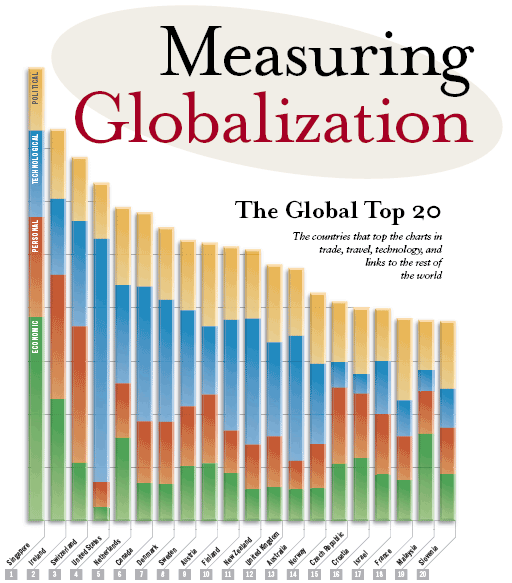Trend of Globalization
Description
Globalization in its literal sense is the process of globalizing, transformation of some things or phenomena into global ones. It can be described as a process by which the people of the world are unified into a single society and function together. This process is a combination of economic, technological, sociocultural and political forces. Globalization is very often used to refer to economic globalization that is integration of national economies into the international economy through trade, foreign direct investment, capital flows, migration, and the spread of technology.
Start from end of the last century, economics of entire world connected as a whole closely. The resources, the capital, the techniques market, the talented person, the information etc. have broken the national boundary and carrying on cross-regional and cross-national exchange. The economic globalization already became one objective tendency.
Modern science and technology development has provided the powerful technical support for the globalization. Internet's era is the true start of the globalization era. The Multinational Corporation is the globalized main carrier and also the impelling force of globalized progress.
Enablers
- Office setup cost (i.e. cost of building land and the cost of the office building (in case the company is the owner of the office space), initial cost of buying equipment and office furniture, etc.)
- Operating costs are involved with day-to-day operations of the office. They include rent or lease payments (if the company is not the owner of the space), Maintenance of equipment, replacement of equipment, office supplies and consumables, insurance, public utilities such as telephone service, Internet connectivity, electricity, water, etc.
- Cost of soft distributions for daily work in an Office
- Adjacent to client for better communication
- Better for localization (Culture, way of working, etc)
Inhibitors
- Cultural, religion, language difference
- Different time region make global management difficult.
- Travelling of people.
- Political reasons.
Paradigms
Globalism increases economic prosperity as well as opportunity, especially among developing nations, enhances civil liberties and leads to a more efficient allocation of resources. In general, this leads to lower prices, more employment, higher output and a higher standard of living for those in developing countries.
Mobile work starts to become new style of working and collaboration. People can use high-tech gadgets support their collaborative work on the business trip wherever they are.
Internet is the significant tool to connect entire world together. Information and knowledge sharing cover whole of the world, people can learn, teach and corporate with each other through internet whenever and wherever.
The range of Office work extends from local to whole world. Colleagues from China, US, Europe can work in one project and have meetings or corporation on net.
Business are doing cross cities and countries. The scope almost covers all domains such as IT, mechanical, medical, trade, education etc. People from different section of the world may do business together.
Experts
- Singapore
- Ireland
- Switzerland
- United States
- Netherlands
- Canada
- Denmark
- Sweden
- Austria
- Finland
- New Zealand
- United Kingdom
- Australia
- Norway
- Czech Republic
- Croatia
- Israel
- France
- Malaysia
- Slovenia
Timing
- Globalization in its largest extent began a bit before the turn of the 16th century, in Portugal.
- Early forms of globalization existed during the Roman Empire, the Parthian empire, and the Han Dynasty, when the silk road started in China, reached the boundaries of the Parthian empire, and continued onwards towards Rome.
- In the 17th century, Globalization became a business phenomenon when the Dutch East India Company, which is often described as the first multinational corporation, was established.
- In the 19th century it was sometimes called "The First Era of Globalization" a period characterized by rapid growth in international trade and investment, between the European imperial powers, their colonies, and, later, the United States.
- The "First Era of Globalization" began to break down at the beginning with the first World War, and later collapsed during the gold standard crisis in the late 1920s and early 1930s.
- Since World War II, barriers to international trade have been considerably lowered through international agreements - General Agreement on Tariffs and Trade (GATT).
- The Uruguay Round (1984 to 1995) led to a treaty to create the World Trade Organization (WTO).
Web Resources
http://en.wikipedia.org/wiki/Globalization
http://www.globalpolicy.org/globaliz/index.htm
http://www.nwlink.com/~donclark/news/news.html
